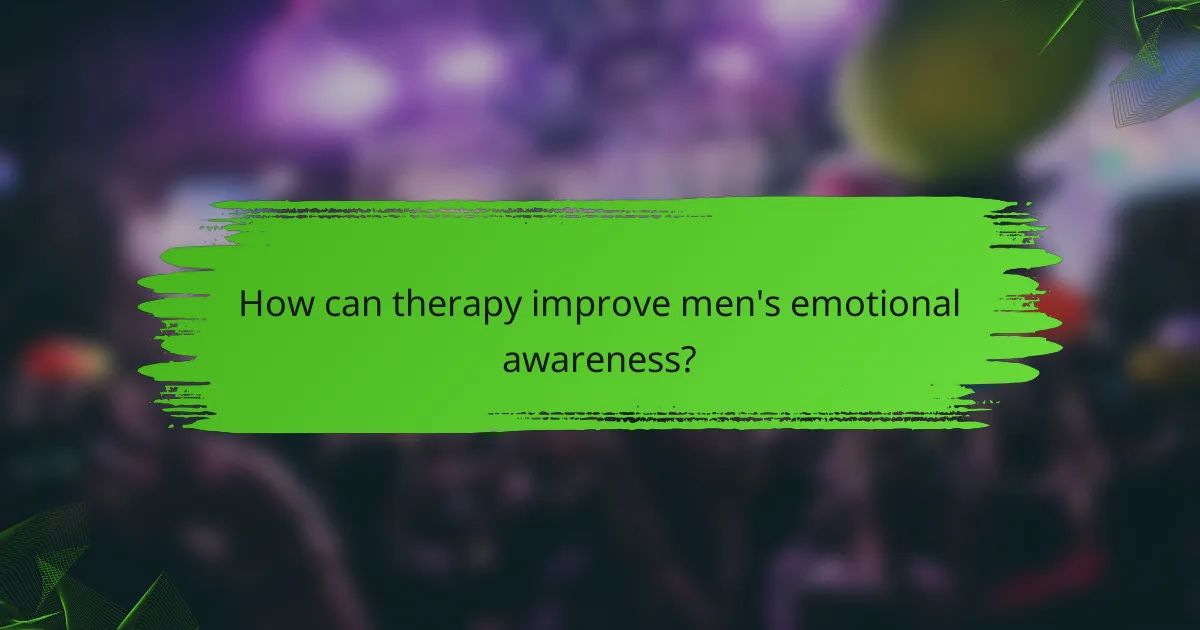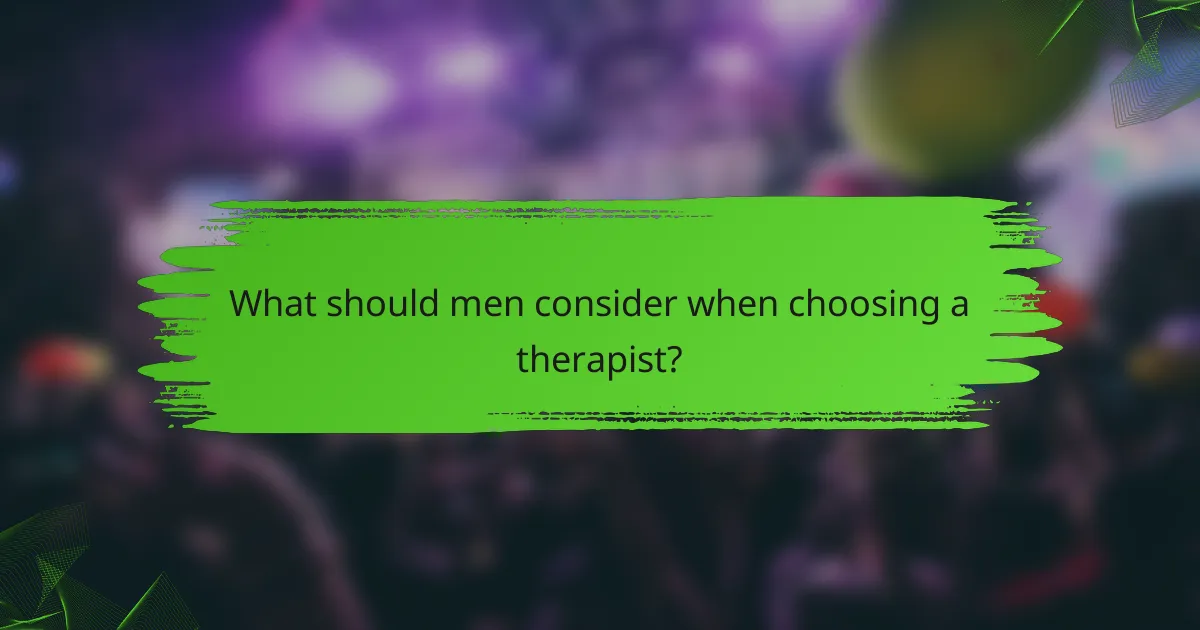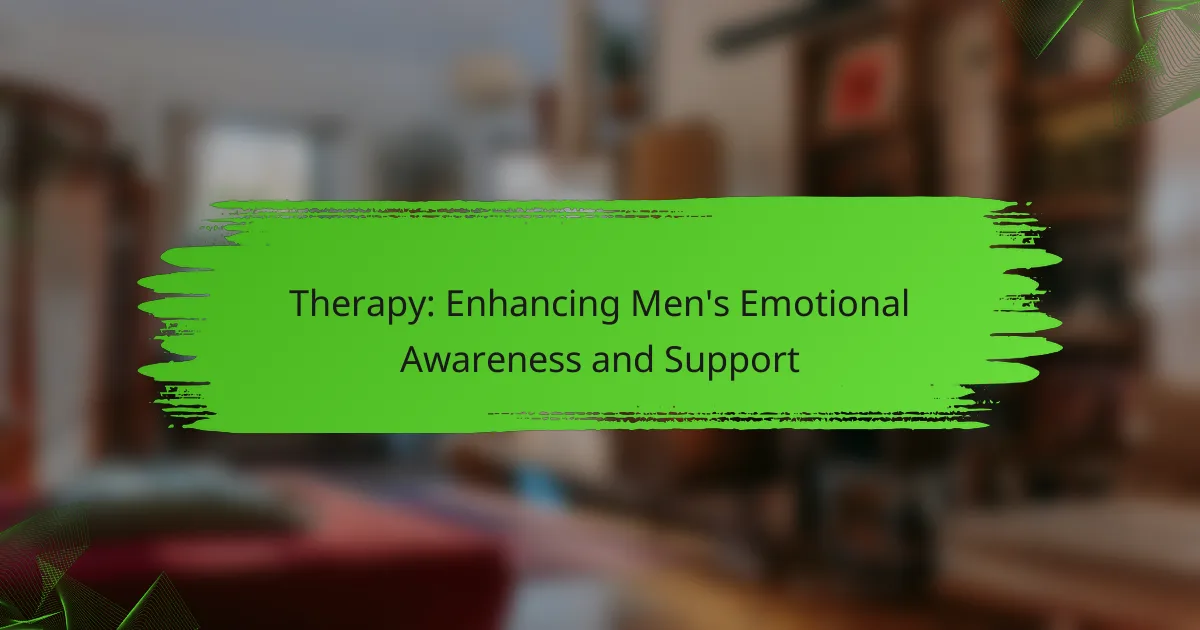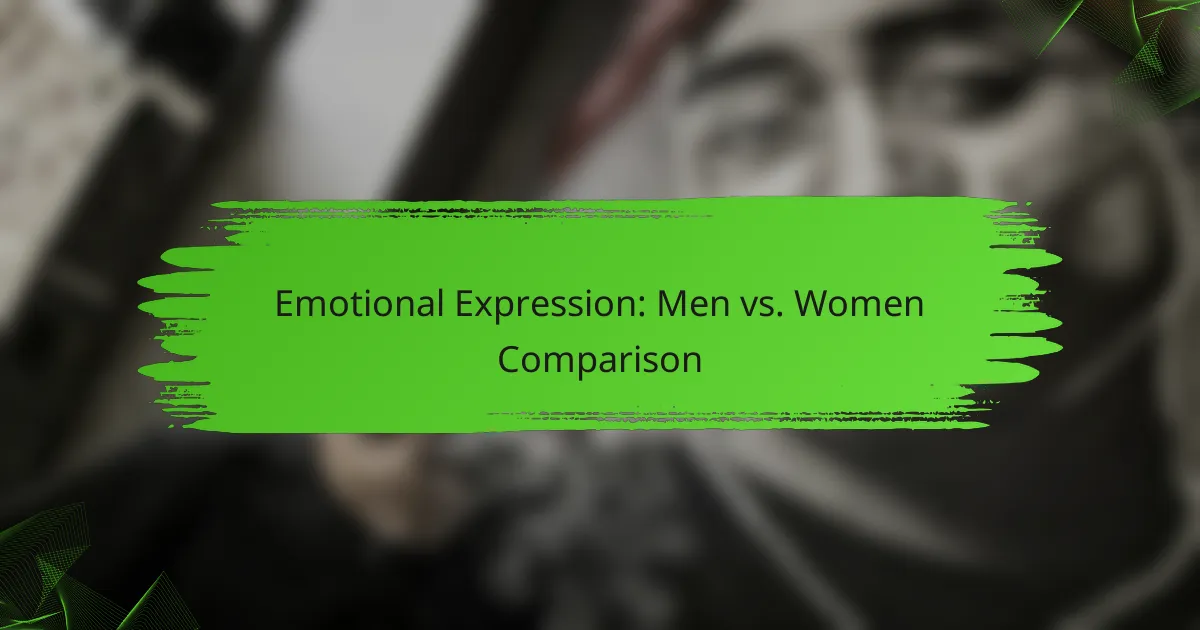Therapy plays a crucial role in enhancing men’s emotional awareness by creating a safe environment for them to explore their feelings and thoughts. By utilizing various therapeutic approaches, such as Cognitive Behavioral Therapy and mindfulness-based techniques, men can learn to identify and manage their emotions more effectively, ultimately leading to improved mental health and coping skills.

How can therapy improve men’s emotional awareness?
Therapy can significantly enhance men’s emotional awareness by providing a safe space to explore feelings and thoughts. Through various therapeutic techniques, men can learn to identify, express, and manage their emotions more effectively.
Increased self-reflection
Therapy encourages men to engage in self-reflection, which is crucial for understanding their emotional landscape. By examining past experiences and current feelings, men can gain insights into their emotional triggers and patterns.
Journaling or discussing specific situations with a therapist can help clarify emotions and motivations. This practice fosters a deeper awareness of how emotions influence behavior and decision-making.
Enhanced communication skills
Improving communication skills is a key benefit of therapy, allowing men to articulate their emotions more clearly. Learning to express feelings verbally can reduce misunderstandings and foster healthier interactions.
Therapists often teach techniques such as “I” statements, which help men communicate their feelings without blaming others. This approach can lead to more constructive conversations and emotional exchanges.
Better coping strategies
Therapy equips men with effective coping strategies to manage stress and emotional challenges. Techniques such as mindfulness, deep breathing, and cognitive restructuring can help men respond to difficult emotions in healthier ways.
By practicing these strategies in therapy, men can develop a toolkit for handling various situations, reducing the likelihood of emotional overwhelm. Regular practice can lead to more resilient emotional health over time.
Stronger relationships
As men become more emotionally aware, their relationships often improve. Enhanced self-reflection and communication skills contribute to deeper connections with partners, friends, and family members.
Therapy can help men understand the importance of vulnerability in relationships, encouraging them to share their feelings and needs. This openness fosters trust and intimacy, leading to stronger, more supportive relationships.

What types of therapy are effective for men?
Several types of therapy can effectively enhance men’s emotional awareness and support. Cognitive Behavioral Therapy (CBT), group therapy, mindfulness-based therapy, and Emotionally Focused Therapy (EFT) are particularly beneficial in addressing emotional challenges and improving mental health.
Cognitive Behavioral Therapy (CBT)
Cognitive Behavioral Therapy (CBT) is a structured, goal-oriented approach that helps men identify and change negative thought patterns and behaviors. It focuses on the connection between thoughts, feelings, and actions, making it effective for issues like anxiety and depression.
In CBT, men learn practical skills to challenge distorted thinking and develop healthier coping mechanisms. Sessions typically involve setting specific goals, practicing new skills, and tracking progress, which can lead to significant improvements in emotional regulation.
Group therapy
Group therapy provides a supportive environment where men can share experiences and feelings with peers facing similar challenges. This format fosters connection and reduces feelings of isolation, which can be particularly beneficial for men who may struggle with emotional expression.
In a group setting, participants can learn from each other and gain different perspectives on their issues. It is essential to choose a group that focuses on relevant topics, such as anger management or relationship issues, to maximize the benefits of shared experiences.
Mindfulness-based therapy
Mindfulness-based therapy emphasizes present-moment awareness and acceptance, helping men manage stress and emotional pain. Techniques such as meditation, breathing exercises, and body scans encourage individuals to observe their thoughts and feelings without judgment.
This approach can enhance emotional awareness and resilience, making it easier for men to cope with life’s challenges. Regular practice of mindfulness techniques can lead to long-term improvements in mental well-being and emotional regulation.
Emotionally Focused Therapy (EFT)
Emotionally Focused Therapy (EFT) is designed to help individuals and couples understand and express their emotions more effectively. This therapy focuses on the emotional bonds between partners, making it particularly useful for men looking to improve relationship dynamics.
EFT involves identifying negative interaction patterns and fostering secure emotional connections. By learning to express vulnerabilities and needs, men can enhance their emotional awareness and build stronger, more supportive relationships.

What are the benefits of therapy for men in urban areas?
Therapy offers numerous benefits for men living in urban areas, including improved emotional awareness, enhanced coping skills, and access to specialized resources. Urban settings often provide a diverse range of therapeutic options that can cater to the unique challenges faced by men in these environments.
Access to specialized programs
Urban areas typically host a variety of specialized therapy programs tailored to men’s specific needs, such as anger management, stress reduction, and relationship counseling. These programs often incorporate evidence-based practices that address issues prevalent among men, like work-related stress or family dynamics.
Men can benefit from workshops and group sessions that foster open discussions about masculinity and emotional health. Participating in these specialized programs can help men develop healthier coping mechanisms and build resilience.
Community support networks
In urban environments, community support networks play a crucial role in enhancing men’s emotional well-being. Local organizations and support groups often provide safe spaces for men to share their experiences and challenges, fostering a sense of belonging and mutual understanding.
Engaging with these networks can lead to valuable connections and friendships, reducing feelings of isolation. Men can find encouragement and accountability through peer support, which can significantly enhance their therapy experience.
Convenient teletherapy options
Teletherapy has become increasingly popular in urban areas, offering men convenient access to mental health services from the comfort of their homes. This flexibility allows men to schedule sessions that fit their busy lifestyles, making it easier to prioritize their emotional health.
Many therapists now offer virtual appointments, which can reduce barriers such as travel time and scheduling conflicts. Men should consider exploring teletherapy as a viable option, especially if they have difficulty finding time for in-person visits.

What should men consider when choosing a therapist?
Men should consider factors such as the therapist’s experience with men’s issues, their approach and methodology, and the location and accessibility of their practice. These elements can significantly impact the effectiveness of therapy and the comfort level of the client.
Therapist’s experience with men’s issues
Choosing a therapist who has experience specifically addressing men’s issues can enhance the therapeutic process. Look for professionals who have training or a focus on topics like masculinity, emotional expression, and male-specific mental health challenges.
It’s beneficial to inquire about their previous work with male clients and the outcomes achieved. A therapist familiar with the unique pressures men face can provide tailored support and understanding.
Approach and methodology
The approach and methodology a therapist uses can greatly influence the therapy experience. Some may employ cognitive-behavioral therapy (CBT), while others might focus on psychodynamic or humanistic approaches.
Consider what resonates with you personally. For instance, if you prefer structured sessions, a therapist using CBT might be ideal. Alternatively, if you seek a more exploratory process, look for someone who emphasizes open dialogue and self-discovery.
Location and accessibility
Location and accessibility are practical yet crucial factors when selecting a therapist. Ensure the therapist’s office is conveniently located, whether in-person or online, to facilitate regular sessions without added stress.
Additionally, check if they offer flexible scheduling options, including evenings or weekends, which can accommodate busy lifestyles. Accessibility also includes considering whether they accept your insurance or offer sliding scale fees for those without coverage.

How can men find support groups in their area?
Men can find support groups in their area by reaching out to local mental health organizations or utilizing online directories. These resources can help identify groups that focus on emotional awareness and support tailored to men’s needs.
Local mental health organizations
Local mental health organizations often provide valuable resources for men seeking support groups. These organizations typically have information on various programs, workshops, and peer support groups specifically designed for men. Contacting them directly can yield insights into available options in your community.
Many cities have non-profit organizations or community health centers that focus on mental health. For example, organizations like the National Alliance on Mental Illness (NAMI) or local chapters of mental health associations can be excellent starting points. They may also offer free or low-cost services, making them accessible to a wider audience.
Online directories
Online directories can be a convenient way to locate support groups for men. Websites such as Psychology Today or Meetup allow users to search for groups based on location and specific interests, including emotional support and mental health. These platforms often provide details about the group’s focus, meeting times, and contact information.
When using online directories, ensure to read reviews and check the credibility of the groups listed. Look for groups that are well-established and have positive feedback from participants. This can help ensure a supportive and safe environment for sharing experiences and feelings.



